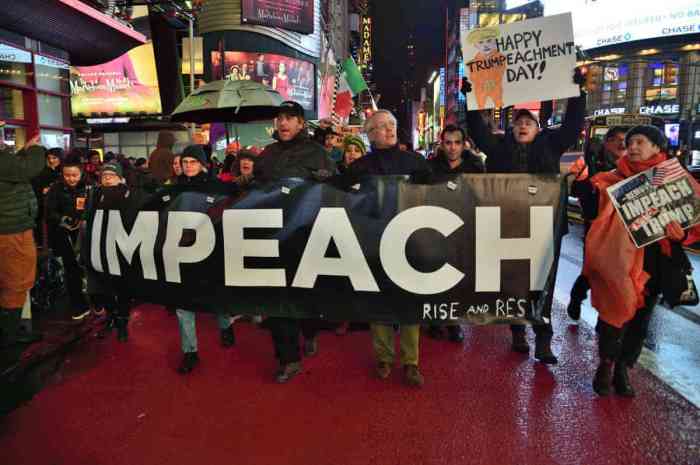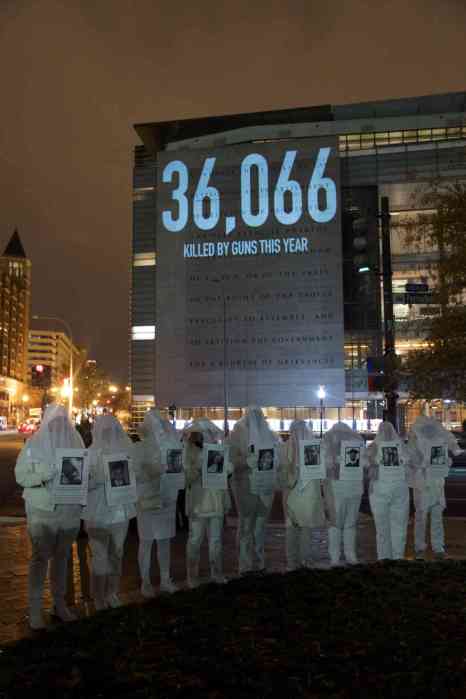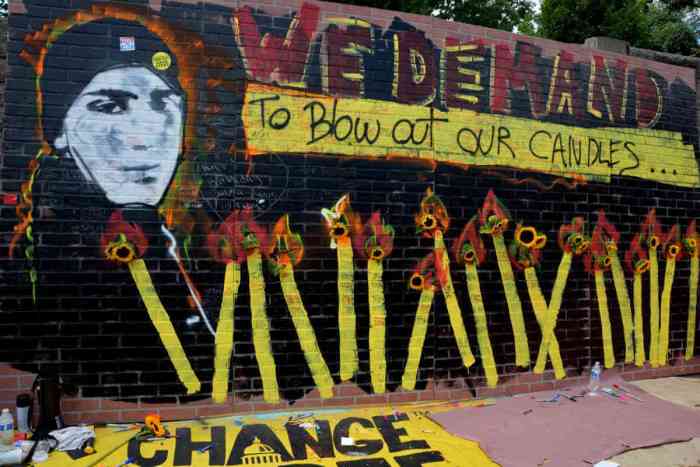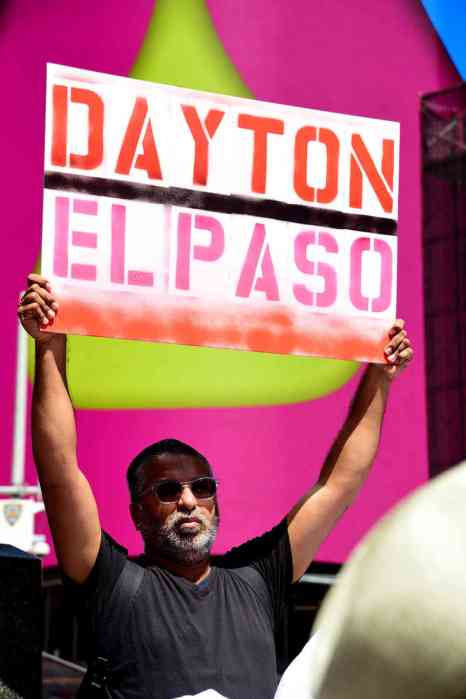Banners carried by protesters who traveled from Trump Tower on Fifth Avenue to Trump International Hotel at Columbus Circle in a July 18 demonstration. | MICHAEL SHIREY
“They woke a sleeping giant with the LGBT community,” said Glenn Zuraw about the National Rifle Association, as he stood outside Trump Tower on Fifth Avenue on July 18. “We should have been here on this issue long before now. I cried for three days after Orlando. I didn’t cry after Newtown, and I’m sorry I didn’t.”
Zuraw was one of more than 500 demonstrators who braved a late afternoon downpour to raise their voices against the NRA, the Republican Party, and Donald Trump, the man that party is coronating as its presidential nominee this week in Cleveland. Protesters – called to Trump Tower by the direct action grassroots group Queer Nation, Gays Against Guns, which formed in response to the June 12 gun slaughter of 49 at an LGBT club in Orlando, and New Yorkers Against Gun Violence – focused their ire on the GOP’s absolutist support for NRA policies, Trump’s repeated xenophobic attacks on immigrants, especially those from Mexico or who are Muslim, and a party platform that even the Log Cabin Republicans have termed the most “anti-LGBT ever.”
Asked what awakening the LGBT movement would mean for the gun debate in America, Zuraw, who lives in Queens, responded, “Look how much we’ve gotten changed. DOMA. Don’t Ask, Don’t Tell. Gay marriage.”
Queer Nation, Gays Against Guns joined by longtime gun control advocates in July 18 demo
Some of the many messages demonstrators had. | MICHAEL SHIREY
Brooklynite Terry Roethlein echoed Zuraw’s thoughts on what the LGBT community can bring to the table in the push for gun control advances.
“What can we in the LGBT community do?,” he said. “Organizing.”
For Roethlein, the issue isn’t something new post-Orlando.
“I’ve been on the anti-gun violence bandwagon for a while,” he said. “Despite the horror of Orlando, one of the bright sides was how I was glad to see that my LGBT brothers and sisters were willing to join this movement. I mean, we have marriage equality, which isn’t so important to me. Here our community is moving beyond the particulars to see something that is good for the whole society. That’s what makes America great.”
For many in the crowd, guns were only a part of what brought them out on the first evening of the Republican National Convention.
“I’m really upset in general with the Republican platform,” said B. C. Craig of Brooklyn. “Trump’s racist xenophobia is added to their inborn homophobia. And Pence is homophobia on steroids.”
Craig quickly pivoted in her comments to the gun issue.
Gays Against Guns spokespeople Tim Murphy (center) and Cathy Marino-Thomas (r.), along with Little Donnie. | MICHAEL SHIREY
“We must stop seeing the NRA as politically inviolable,” she said. “They must be made toxic so that no candidate takes their money or their endorsement. The NRA is responsible for so many deaths, especially people of color.”
Tim Murphy, a media spokesperson for Gays Against Guns, reinforced Craig’s suggestion that gun control advocates must marginalize the powerful NRA. Already the new group has staged demonstrations against Long Island Republican Congressmember Lee Zeldin and New Jersey GOP Representative Tom MacArthur, both aimed at “embarrassing” NRA supporters on their home turfs. Murphy mentioned other potential targets, including Republican senators seeking reelection such as New Hampshire’s Kelly Ayotte, Ohio’s Rob Portman, and North Carolina’s Richard Burr.
Murphy said, “We are going to name and shame the whole chain of death” on the gun issue, including those who invest in gun manufacturers – the Blackstone Group and Credit Suisse have been frequent targets of criticism on that score – the manufacturers themselves, the NRA, and legislators who are “puppets” of the gun lobby.
In addition to Zeldin, Leah Gunn Barrett, the executive director of New Yorkers Against Gun Violence, mentioned six other New York Republicans in Congress her group is putting pressure on, including Richard Hanna, Chris Gibson, Tom Reed, Chris Collins, Elise Stefanik, and John Katko.
Gunn Barrett contrasted the current political climate with that of the 1990s, when many Democrats became skittish about gun control after elections reversals that followed legislation pushed by President Bill Clinton banning the sale of assault rifles. Alluding to Hillary Clinton favorably, she said, “It is very unusual for the Democratic presidential candidate to speak as forcefully on the gun issue as she has.”
New Yorkers Against Gun Violence's Leah Gunn Barrett speaks to the crowd in Columbus Circle. | MICHAEL SHIREY
Still, New Yorkers Against Gun Violence is also working to keep Democrats accountable. Governor Andrew Cuomo, Gunn Barrett said, “needs to get busy.” The state has not yet developed the point of sale ammunition background check database required under Cuomo’s 2013 gun legislation, and Governor Jerry Brown in California has led his state much further, she said, adding that remaining issues New York must tackle include firearms safe storage and ammunition microstamping requirements, as well as provisions to remove firearms from people “in crisis.”
Gunn Barrett said she got engaged in the gun control issue after the 1997 murder of her brother, 40-year-old Gregory Gaines Gunn, who was married with two children, at his Oklahoma business.
Cathy Marino-Thomas, another Gays Against Guns spokesperson, emphasized that any Democrats who continue to take money from the NRA will be protested along with Republicans.
“No one is exempt,” she said, even as she suggested that the Cleveland convention was the site of many of the worst offenders.
“Why are they not allowed to carry guns inside the hall, if they are so safe?,” Marino-Thomas asked of rules barring weapons from the convention center, despite Ohio’s open carry law that allows demonstrators outside to have guns. “Why do they get a safe zone and nobody else does?”
The crowd at Columbus Circle. | MICHAEL SHIREY
Several of the protesters speculated on the kinds of coalitions that could be built around the gun issue. Craig and Roethlein each mentioned that law enforcement officials often speak out about the need for sensible gun legislation, and that instinct may be heightened in the wake of the targeted shooting deaths of eight police officers in Dallas and Baton Rouge. Both, however, emphasized that any conversation about such a coalition strategy must include people of color, among whom there is widespread anger over shooting deaths by police.
“We have to find common ground,” Roethlein said. “But Black Lives Matter will have to be part of the conversation. Not just white liberals.”
That point underscored one of the challenges for a movement that, at least on this occasion, fielded a crowd of protesters that was predominately white. As the demonstrators reached Columbus Circle, where the Trump International Hotel is located, after marching from Fifth Avenue, one black man watching the procession called out, “I would be with you if all the guns would be gone, but what you want would take the guns away from everyone except the people I don’t want to have the guns. That’s why I need my gun.”






































